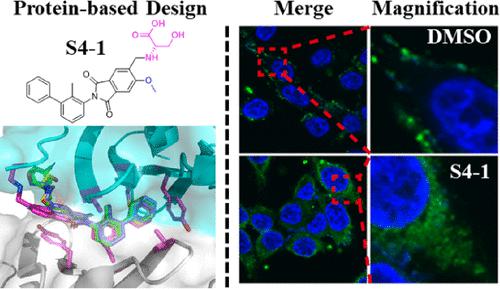当前位置:
X-MOL 学术
›
J. Med. Chem.
›
论文详情
Our official English website, www.x-mol.net, welcomes your
feedback! (Note: you will need to create a separate account there.)
Novel Small-Molecule PD-L1 Inhibitor Induces PD-L1 Internalization and Optimizes the Immune Microenvironment
Journal of Medicinal Chemistry ( IF 6.8 ) Pub Date : 2022-12-29 , DOI: 10.1021/acs.jmedchem.2c01801 Chengliang Sun 1, 2, 3 , Mingxiao Yin 4 , Yao Cheng 1, 5 , Zean Kuang 4 , Xiaojia Liu 4 , Gefei Wang 1, 2, 3 , Xiao Wang 1, 2, 3 , Kai Yuan 1, 2, 3 , Wenjian Min 1, 2, 3 , Jingwen Dong 4 , Yi Hou 1, 2, 3 , Lingrong Hu 1, 2, 3 , Guoyu Zhang 1, 2, 3 , Wenli Pei 1, 2, 3 , Liping Wang 1, 2, 3 , Yanze Sun 1, 2, 3 , Xinmiao Yu 1, 2, 3 , Yibei Xiao 1, 5 , Hongbin Deng 4 , Peng Yang 1, 2, 3
Journal of Medicinal Chemistry ( IF 6.8 ) Pub Date : 2022-12-29 , DOI: 10.1021/acs.jmedchem.2c01801 Chengliang Sun 1, 2, 3 , Mingxiao Yin 4 , Yao Cheng 1, 5 , Zean Kuang 4 , Xiaojia Liu 4 , Gefei Wang 1, 2, 3 , Xiao Wang 1, 2, 3 , Kai Yuan 1, 2, 3 , Wenjian Min 1, 2, 3 , Jingwen Dong 4 , Yi Hou 1, 2, 3 , Lingrong Hu 1, 2, 3 , Guoyu Zhang 1, 2, 3 , Wenli Pei 1, 2, 3 , Liping Wang 1, 2, 3 , Yanze Sun 1, 2, 3 , Xinmiao Yu 1, 2, 3 , Yibei Xiao 1, 5 , Hongbin Deng 4 , Peng Yang 1, 2, 3
Affiliation

|
Blocking the PD-1/PD-L1 interaction has become an important strategy for tumor therapy, which has shown outstanding therapeutic effects in clinical settings. However, unsatisfactory response rates and immune-related adverse effects limit the use of anti-PD1/PD-L1 antibodies. Here, we report the discovery and identification of S4-1, an innovative small-molecule inhibitor of PD-L1. In vitro, S4-1 effectively altered the PD-L1/PD-1 interaction, induced PD-L1 dimerization and internalization, improved its localization to endoplasmic reticulum, and thus enhanced the cytotoxicity of peripheral blood mononuclear cells toward tumor cells. In vivo, S4-1 significantly inhibited tumor growth in both lung and colorectal cancer models, particularly in colorectal cancer, where it led to complete clearance of a portion of the tumor cells. Furthermore, S4-1 induced T-cell activation and inversed the inhibitory tumor microenvironment, consistent with the PD-L1/PD-1 pathway blockade. These data support the continued evaluation of S4-1 as an alternative ICB therapeutic strategy.
中文翻译:

新型小分子 PD-L1 抑制剂诱导 PD-L1 内化并优化免疫微环境
阻断PD-1/PD-L1相互作用已成为肿瘤治疗的重要策略,在临床中显示出良好的治疗效果。然而,不理想的缓解率和免疫相关的不良反应限制了抗PD1/PD-L1抗体的使用。在这里,我们报告了S4-1的发现和鉴定,S4-1 是一种创新的 PD-L1 小分子抑制剂。在体外, S4-1有效改变PD-L1/PD-1相互作用,诱导PD-L1二聚化和内化,改善其在内质网的定位,从而增强外周血单个核细胞对肿瘤细胞的细胞毒性。在体内, S4-1显着抑制肺癌和结直肠癌模型中的肿瘤生长,特别是在结直肠癌中,它导致部分肿瘤细胞完全清除。此外, S4-1诱导 T 细胞激活并逆转抑制性肿瘤微环境,这与 PD-L1/PD-1 通路阻断一致。这些数据支持对S4-1作为替代 ICB 治疗策略的持续评估。
更新日期:2022-12-29
中文翻译:

新型小分子 PD-L1 抑制剂诱导 PD-L1 内化并优化免疫微环境
阻断PD-1/PD-L1相互作用已成为肿瘤治疗的重要策略,在临床中显示出良好的治疗效果。然而,不理想的缓解率和免疫相关的不良反应限制了抗PD1/PD-L1抗体的使用。在这里,我们报告了S4-1的发现和鉴定,S4-1 是一种创新的 PD-L1 小分子抑制剂。在体外, S4-1有效改变PD-L1/PD-1相互作用,诱导PD-L1二聚化和内化,改善其在内质网的定位,从而增强外周血单个核细胞对肿瘤细胞的细胞毒性。在体内, S4-1显着抑制肺癌和结直肠癌模型中的肿瘤生长,特别是在结直肠癌中,它导致部分肿瘤细胞完全清除。此外, S4-1诱导 T 细胞激活并逆转抑制性肿瘤微环境,这与 PD-L1/PD-1 通路阻断一致。这些数据支持对S4-1作为替代 ICB 治疗策略的持续评估。































 京公网安备 11010802027423号
京公网安备 11010802027423号